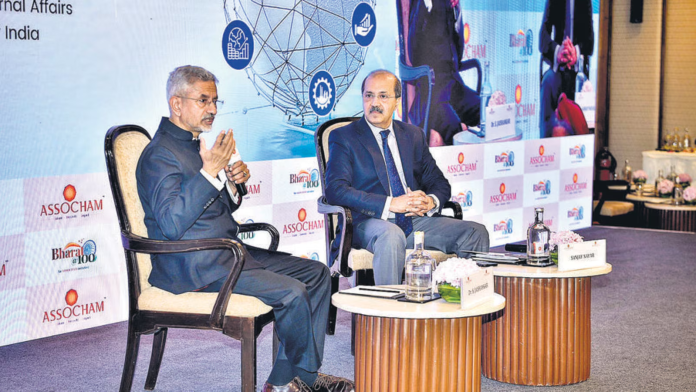India should have a balanced approach to business with China because of the troubled political relationship witnessed over the past four years and the imperative of not becoming dependent on a single supply chain, external affairs minister S Jaishankar said on Thursday.
Though the recent understanding with China on resolving the remaining “friction points” on the LAC resulted in “some progress”, the two sides need to have further discussions on taking things forward, Jaishankar said at an event organised by the Associated Chambers of Commerce & Industry of India (Assocham).
“Nobody is saying don’t do business [with China]. But we are equally saying, we think about it, weigh it, look at the bigger term implications, especially for MSMEs. We don’t want to end up as a market of another economy and not be able to compete with their products, which are dumped in our country,” Jaishankar said.
India must consider that China accounts for nearly a third of global manufacturing and many supply chains go through that country, and be careful about becoming excessively dependent on single supply chains or opening markets in a way that various sectors get “hollowed out”, he said.
“There’s a second problem, and [it] is that for the last four-and-a-half years, our political relationship with China has not been good…because of the situation in the border,” he said, adding that “things have improved a little bit” following the understanding on patrolling and disengagement at Demchok and Depsang.
“We have managed to make some progress out there. We have to now sit down and discuss with the Chinese what we do further. But I think there are no black and white answers in very sharp terms. I think everything needs to be balanced and weighed and I would advocate that with China,” Jaishankar said.
The military standoff on the Line of Actual Control, which began in April-May 2020, took bilateral relations to their lowest point in six decades. After protracted negotiations through diplomatic and military channels, the two sides reached an understanding on disengagement at Demchok and Depsang on October 21. Prime Minister Narendra Modi and President Xi Jinping met two days later and agreed to revive several mechanisms to address the border dispute and normalise ties.
Jaishankar also said India is in a “much more advantageous position” than many other countries to build deeper ties with the incoming Donald Trump administration in the US. “We’ll have to work out a political equation with America and that is one area where we score because we’ve always had a positive political relationship with Trump. I would say Trump has always had a positive political view of India,” he said.
“It will not automatically translate into every transaction. Like everybody else, we may also have some issues…there are countries who [are] looking at the Trump 2.0 as a political challenge. We are not…We are in a much more advantageous position to translate [Trump] 2.0 into a deeper relationship,” he added.
A new Trump administration is expected to come with “a stronger commitment in America to manufacturing” and “a belief in America that other partners have not been fair”, Jaishankar noted. While the US will remain the largest power in terms of a global presence, the new administration could be focused on “more immediate outcomes and results” and India can deal with this by sending out a message “that our interests are aligned and anything we do, both will benefit”, he said.
In the context of the burgeoning but skewed India-Russia trade relationship, Jaishankar said New Delhi has been pressing Moscow to address non-tariff barriers that are impeding Indian exports. At the same time, he pointed out that Russia is expected to remain a long-term supplier of commodities such as oil, coking coal and fertilisers.
“We also need access, on a long-term and sustainable basis, to natural resources. For me, the countries which are basically natural resources economies – Russia, Australia, Indonesia and Brazil – these are our natural partners,” he said.
Jaishankar said a “good customer” such as India also has the right to have better access to the Russian economy. “So, we are pressing them (for access) in the pharma industry, marine products, some of the agro-products. There are SPS [sanitary and phytosanitary] restrictions, non-tariff barriers, standards [and] they make you do things even if you have certification somewhere else,” he said, referring to problems faced by Indian exporters.
“These are standard tactics which everybody employs to keep the other guy out. Now we have to find ways of going through it and persuading them, cajoling them. I think we will make progress,” he said.
Jaishankar said he had told Russian first deputy prime minister Denis Manturov during a meeting last month that the “Russian economy should open up much more to exports from India”.
India-Russia trade ballooned dramatically to $66 billion during 2023-24, largely on the back of New Delhi’s purchase of discounted Russian crude. The two sides have set a bilateral trade target of $100 billion by 2030, but India has concerns over its exports being worth less than $5 billion in the overall two-way trade.









































